

After years of neglect, the minimum wage has suddenly become a major national issue. President Obama has proposed an increase in the federal minimum to $10.10 an hour, fast food workers are agitating for $15, and candidates who back a higher wage floor, including an avowed socialistin Seattle, are winning local elections. In February, the retailer Gap Inc. announced that it was implementing a nationwide minimum wage for 65,000 of its own 90,000 employees (although only $9 an hour).
The minimum wage is an important issue in other countries as well, although we rarely hear about these cases.
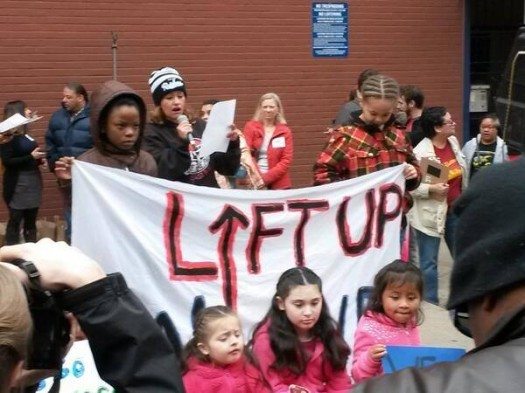

A man wearing the uniform and cap of a fast-food worker, his apron tucked into a pant pocket, approached a clerk at the Alameda County Social Service Agency. As he handed over documents for his public assistance benefits claim, the man explained how it had felt to be waiting in the lobby for the past several hours:
“I was the first here and the last to leave.”
“You should get a pay check!” the clerk responded.
The reality is that this man does “get a paycheck” from his minimum wage job, but finds himself unable to meet his basic needs. This is a common scene at my office in Oakland and public assistance offices across the country.
This month’s National Association of Social Workers’ theme is “All People Matter,” chosen to remind us of our profession’s commitment to improving social conditions for all.
» Read more about: ‘All People Matter’ — It’s Time to Raise the Minimum Wage »
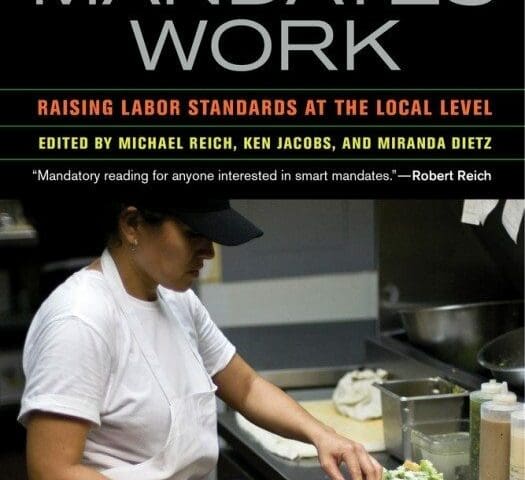
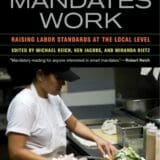
Forget, for the moment, downer news stories coming out of Midwestern statehouses, Southern auto plants and sundry federal courts. A new book edited and co-written by three Bay Area researchers optimistically chronicles what can be accomplished when progressive politicians and a determined electorate, backed by an energetic union movement, tackle income inequality, health care, labor peace and other challenges. When Mandates Work: Raising Labor Standards at the Local Level, edited by Michael Reich, Ken Jacobs and Miranda Dietz, parses a dozen years of legislation passed by San Francisco voters or their board of supervisors. Thanks to 10 ordinances enacted between 1996 and 2008 —
In an interview with Capital &
» Read more about: How San Francisco Created a New Social Compact: An Interview With Ken Jacobs »
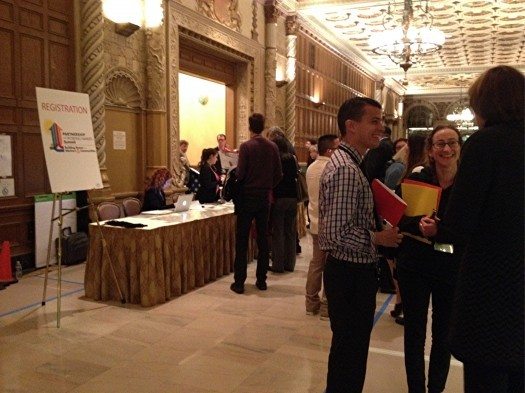

The Partnership for Working Families Summit kicked off Tuesday in Los Angeles as activists from around the country convened at the Biltmore Hotel for three days of workshops and talks focused on creating good jobs, sustainable industries and strong unions.
The Partnership includes such groups as the Los Angeles Alliance for a New Economy (LAANE), Puget Sound Sage and the Alliance for a Greater New York (ALIGN). While attendees came from a range of organizations and campaigns, the idea that cities can be platforms for change provided a common thread. As Leslie Moody, the Partnership’s outgoing executive director, put it in her opening remarks, “Cities matter.”
Moody pointed to the new set of progressive mayors taking office across the U.S., but added that elected leaders do not act alone. She cited the way communities have pushed new civic officials to follow through with constructive policies.
“We’re not going to wait for federal change,” Moody said,


The holiday interlude brought a mixed blessing from Seattle —that’s the positive spin, frankly—in the form of King County Superior Court Judge Andrea Darvas’ ruling in the SeaTac minimum wage case. The complaint, officially named BF Foods v. City of SeaTac, concerns Proposition 1, a ballot initiative adopted by the voters of the City of SeaTac last November, that raised wages to $15 an hour for airport and hotel workers.
Opposition to the measure was rather heated, as opponents sued to keep the matter off the ballot. Having failed in that endeavor, they spent big money to defeat it. Having lost, a recount, which did not change the results. After which, this suit.
The main litigant, according to press reports, is Alaska Airlines; they cleverly brought in the Port of Seattle, which runs the airport. The legal approach here was something of a kitchen sink strategy,
» Read more about: SeaTac Minimum Wage Law Faces Catch-22 Hurdles »
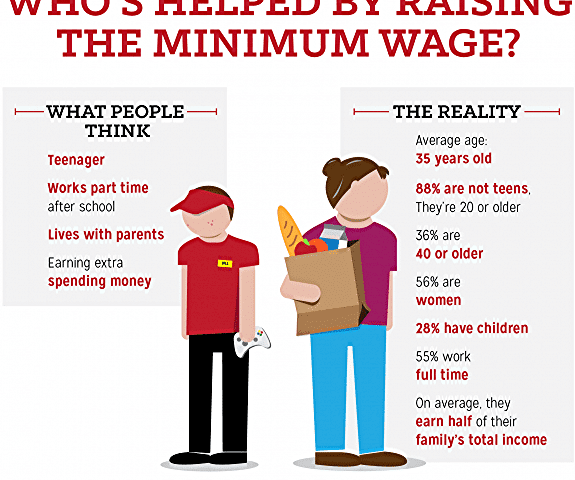
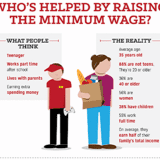
Infographic Source: Economic Policy Institute
(Today’s Los Angeles Times reported that strike actions against local fast-food outlets, launched by workers demanding a living wage, began early this morning. The following story from Equal Voice News sets the background for this day of national action.)
Fast food workers – who say their hourly wages are not enough to keep up with the cost of living – are planning a nationwide strike Thursday in about 35 cities. The industry employs about four million people.
Their message to restaurant chain owners and the public: Because of the pay, they often have to pit buying food against paying for their housing – and that, they say, seems strikingly odd in the United States.
In fact, some say they need food stamps to survive despite being employed.
Restaurant associations and representatives from fast food outlets point to the jobs as cooks and cashiers as opportunities to move up the career ladder – especially to become a manager and earn more money.
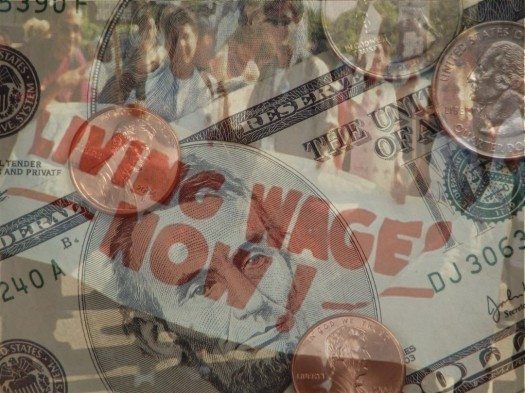
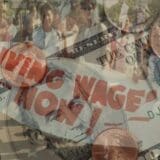
Through the years, the centerpiece of living wage campaigns has generally been a focus on fairness and economic justice for workers. And rightly so. Successful living wage campaigns have resulted in critical gains for workers and their families, bringing everything from increased economic security to improved access to quality health care. These material gains have meant a world of difference for real people and have helped lift thousands out of poverty to achieve a decent standard of living – something we all deserve, regardless of the work we do.
But a living wage is not just about improving the quality of life for individual workers — it can also be a powerful mechanism for stimulating local economies, boosting local businesses and confronting the growing problem of poverty in our communities.
A new report released this week by the Los Angeles Alliance for a New Economy (LAANE) approaches the idea of a living wage from this perspective and examines how improved wages and benefits for thousands of L.A.’s hotel workers have the potential to help bring economic renewal to our neighborhoods and our city as a whole.
» Read more about: Living Wages: Good for Business, Good for L.A. »
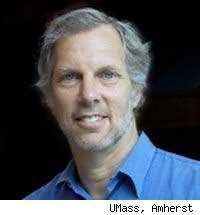

Few American economists want anything to do with social movements. Then there’s Robert Pollin, who has embraced his role as a progressive with a prolific output of books, studies and articles that make the economic case for greater equality.
Pollin, who will be honored at the L.A. Alliance for a New Economy’s (LAANE) City of Justice Awards Dinner next month, rose to prominence in the late 1990s as the most ardent academic defender of living wage laws. In recent years he has advanced the case for a new green economy based on good jobs and environmentally sensible policies.
Pollin, a professor of economics at the University of Massachusetts – Amherst and co-director of the Political Economy Research Institute, may be left of center but he is no business-bashing liberal. To the contrary, he learned from his father – the late Abe Pollin,
» Read more about: Progressive Economist Robert Pollin Gets Down to Business »


(This opinion piece first appeared in today’s Los Angeles Times.)
The U.S. economy has turned a corner. The national unemployment rate hit a post-recession low of 7.8 percent in September. Rising consumer confidence, increasing home prices and other leading economic indicators confirm the trend.
Unemployment is still too high, but a focus on the number of jobs obscures a serious long-term crisis of declining wages and a shrinking middle class that is having a harder and harder time making ends meet. New jobs pay less, raises are rare and benefits even rarer. According to a National Employment Law Project study released in August, the majority of new jobs created in the last two years pay just $13.83 an hour or less. Nobel laureate economist Joseph Stiglitz recently said, “Increasing inequality means a weaker economy” for all of us.
» Read more about: Raising the Minimum Wage Is the Least We Can Do »
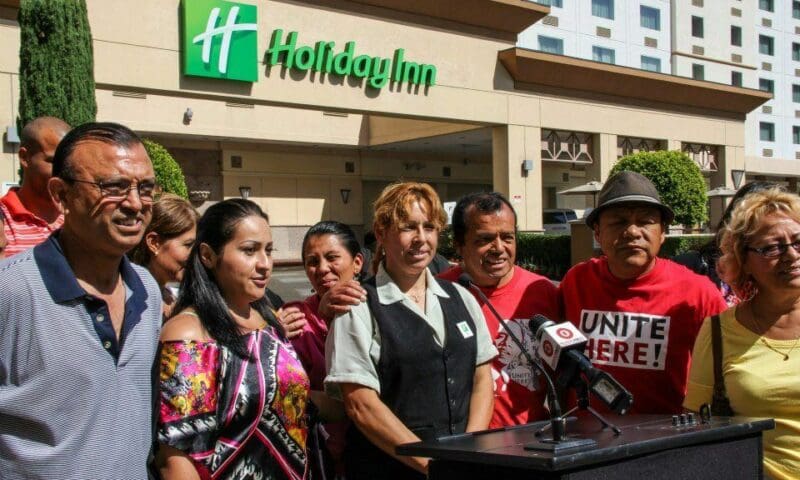

Workers at hotels near LAX on Century Boulevard are supposed to be covered under a 2008 Living Wage Ordinance providing wages of at least $11.97 an hour. A new class action lawsuit alleges that the Holiday Inn LAX willfully violated a host of wage and hour laws — and workers have revealed that conditions at the hotel are unsafe for guests.
UNITE HERE Local 11, who are supporting bartenders, housekeepers, cooks and other Holiday Inn LAX employees, issued a press release on the new class-action lawsuit, that seeks damages for, “back wages, not respecting [employees’] right to take meal breaks, not reimbursing them for expenses incurred while performing their work, and failure to pay them the mandatory ‘Living Wage’ required for all LAX-area hotels.”
Workers allege that they worked over eight hours a day without being paid overtime, their time sheets were tampered with,
» Read more about: LAX Holiday Inn Workers Allege Living Wage Violations »
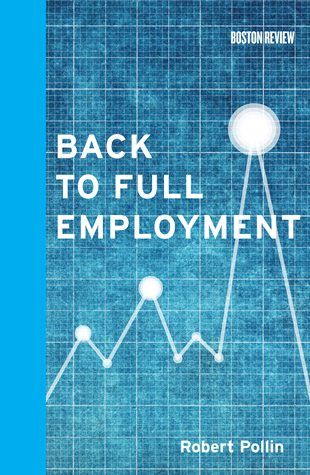
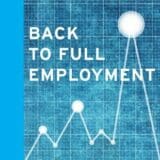
With tens of millions of Americans still out of work, the idea of the U.S. achieving full employment might seem like a pipe dream.
Not so, argues Professor Robert Pollin in his new book, Back to Full Employment. In fact, Pollin (who uses the standard definition of full employment as four percent or less unemployment) suggests that the ongoing jobs crisis offers the perfect opportunity for us to pursue what was once a cornerstone of national economic policy.
Pollin, co-director of the Political Economy Research Institute at University of Massachusetts, Amherst, is no stranger to controversy. Beginning in 1996, when he was asked by living wage proponents in L.A. to conduct a study on how such a policy would affect the city, he has regularly incurred the wrath of free market diehards with his findings that modest mandated wage increases do not wreak havoc on business.
» Read more about: Economist Robert Pollin on Restoring Full Employment in America »